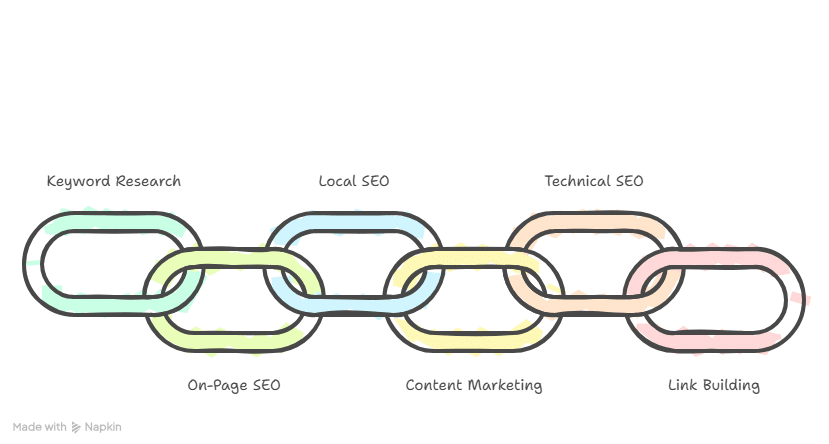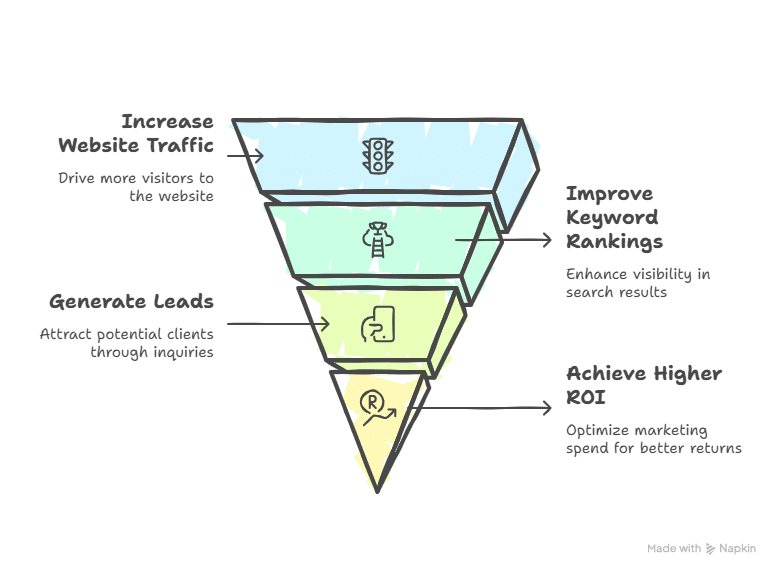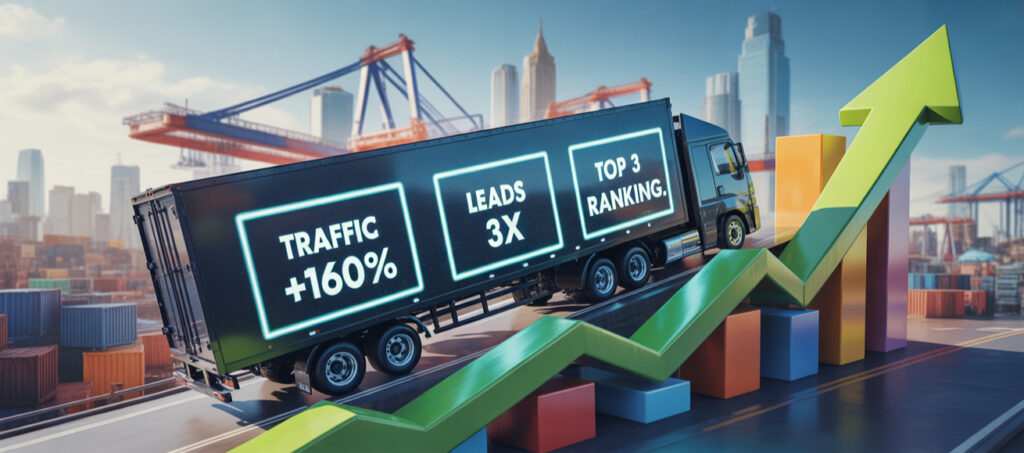In today’s fast-moving supply chain world, every business—from eCommerce to manufacturers—relies on logistics companies. But here’s the catch: if your logistics company can’t be found online, you’re invisible to your potential clients. Customers searching for freight forwarding, warehousing, or trucking services start their journey on Google. If your competitors are there and you are not, you’re losing business daily.
That’s where SEO for logistics companies comes in. SEO (Search Engine Optimization) helps your logistics business appear higher on search engines, attract the right audience, and generate qualified leads. In this guide, we’ll explain why SEO is essential, what strategies work best, and how our approach has helped logistics businesses grow.
Think of It as GPS for Your Business Online!
SEO for logistics companies is the process of improving your website so that when people search for “logistics services near me,” “freight forwarding company,” or “3PL provider,” your company shows up at the top.
Unlike paid ads that stop bringing results when your budget ends, SEO builds long-term visibility. It makes your logistics business the go-to option in your area and service niche.
In simple words: SEO for logistics companies = more visibility, more trust, and more customers.
1. Most clients search online first
Almost every business starts with Google before choosing a logistics partner. If someone needs warehousing, trucking, or freight forwarding, they type it into Google: “logistics company near me”. If your company doesn’t show up, they’ll pick your competitor. That’s why SEO for logistics companies is essential—to make sure you’re found where clients are already searching.
2. Competitors are already investing
Big players like DHL, FedEx, and Blue Dart have strong SEO campaigns. Even smaller regional logistics companies are optimizing their websites to rank locally. If you don’t invest in SEO, competitors will capture the leads that could have been yours. SEO levels the playing field, so smaller logistics companies can compete with industry giants.
3. SEO is cost-effective
Running Google Ads or social media ads costs money every day. Once you stop paying, the traffic disappears. SEO, on the other hand, keeps working even after the initial setup—your rankings bring organic (free) traffic. Over time, SEO gives a much higher ROI (Return on Investment) compared to paid ads. That’s why many logistics companies prefer SEO for sustainable lead generation.
4. Builds trust and credibility
When your company appears on the first page of Google, people automatically trust you more. High rankings act like a “digital stamp of authority.” Customers feel more confident contacting a logistics company that shows up at the top versus one they’ve never heard of. SEO builds not just visibility, but also brand reputation.
5. Real example: Cold chain logistics in Mumbai
Imagine a business looking for “cold chain logistics in Mumbai.” Google shows them a list of companies, and the top three usually get 70–80% of all clicks. If your company is optimized with SEO for Logistics Companies, you appear first, get the inquiry, and possibly win a long-term contract. Without SEO, that client may never even know your business exists.
Don’t let your competitors take your clients—optimize your logistics website with our proven SEO strategies and start capturing leads today.
Key SEO Strategies for Logistics Companies

1. Keyword Research
The foundation of SEO is selecting the right keywords. For logistics companies, it’s important to focus on terms that customers actually search for. This can include freight forwarding services, 3PL SEO solutions, cold chain logistics, trucking company SEO, and local terms such as “logistics company in Chennai.” By carefully targeting these keywords, your website will attract qualified leads who are already looking for your services. That’s why effective SEO for logistics companies always starts with proper keyword mapping.
2. On-Page SEO
Your service pages are the core of your website, and they must be optimized to rank well. This includes writing clear, keyword-rich titles and meta descriptions, structuring headings with terms like “freight forwarding SEO” and “warehouse logistics solutions,” and adding schema markup such as FAQ, LocalBusiness, and Reviews. For example, instead of using a generic title like “Our Services,” a stronger version would be “Freight Forwarding and Logistics Services in India.” These adjustments help search engines and customers clearly understand what you offer.
3. Local SEO
Many logistics clients want service providers in their own region, which is why local SEO is essential. By optimizing your Google Business Profile, ensuring NAP (Name, Address, Phone) consistency across directories, encouraging reviews, and creating location-based service pages such as “Logistics Company in Delhi,” you make it easy for local clients to find you. Appearing in Google Maps and the local 3-pack gives you a powerful edge over competitors.
4. Content Marketing for Logistics Companies
High-quality content is one of the best ways to showcase your expertise and bring in leads. Logistics businesses can benefit from publishing blogs about industry trends, detailed case studies, FAQ pages to answer common client questions, and videos such as warehouse tours or fleet introductions. Each piece of content is a new opportunity to rank for keywords and attract prospects. That’s why SEO for logistics companies is strongest when supported by consistent, targeted content marketing.
5. Technical SEO
Even the best content will fail if your website doesn’t perform well. Technical SEO ensures your site is fast, mobile-friendly, secure, and easy to navigate. Clients expect pages to load within seconds, and Google rewards sites that are optimized for speed, HTTPS security, and mobile design. For logistics companies with multiple service offerings, having clear navigation is critical. Technical SEO lays the groundwork for long-term ranking success.
6. Link Building & Authority
Authority is a major factor in SEO, and one of the best ways to build it is through link building. Logistics companies can earn powerful backlinks by being featured in industry directories, publishing guest posts in logistics magazines, partnering with chambers of commerce, and sending out press releases for company updates. The more high-quality links pointing to your website, the more search engines view your business as trustworthy.
Common SEO Mistakes Logistics Companies Make
1. Using generic keywords instead of logistics-specific ones
Many logistics companies target broad terms like “best transport service” or “delivery solutions.” These are too generic and attract the wrong audience. Instead, using logistics-specific keywords such as “freight forwarding services,” “cold chain logistics,” or “3PL provider in [city]” helps attract qualified leads who are actively searching for the exact services you offer.
2. Ignoring local SEO (missing Google Business Profile)
Local clients often search for logistics providers close to them, but many businesses overlook optimizing their Google Business Profile. Without this, your company won’t show up in Google Maps or the local 3-pack results. Local SEO also relies on consistent Name, Address, and Phone (NAP) details across directories. Skipping this step means losing valuable leads to competitors—making SEO for Logistics Companies essential for capturing local demand and staying visible.
3. Having slow websites with poor user experience
If your website takes more than a few seconds to load, most visitors will leave before they even see your services. A slow or confusing website signals unreliability, which is the last thing logistics clients want. Mobile users, in particular, expect fast, easy navigation. A site that isn’t mobile-friendly or structured properly will push potential customers toward competitors with better websites.
4. Not tracking ROI (leads, conversions)
Some logistics companies run SEO campaigns but never track the results. Without monitoring website leads, calls, and conversions, you can’t measure whether your SEO is driving business growth. Tracking ROI (Return on Investment) is essential to understand which keywords, content, and strategies are delivering new clients—and where improvements are needed.
Avoiding these mistakes ensures your SEO campaign works effectively, helping your logistics company improve visibility, attract qualified clients, and achieve measurable results.
Measuring SEO Success for Logistics Companies
You can’t improve what you don’t measure, which is why tracking the right KPIs (Key Performance Indicators) is critical for any logistics SEO strategy. By monitoring performance, you can see exactly what’s working and make data-driven adjustments—showing how effective SEO for Logistics Companies can be in driving measurable growth and long-term success.

1. Website traffic from organic search
Monitoring how much traffic comes from Google shows whether your SEO efforts are paying off. A steady increase in organic traffic means more potential clients are discovering your services without paid ads.
Benefit: More visibility leads to more inquiries and stronger brand recognition in your market.
2. Keyword rankings for logistics terms
Tracking rankings for important keywords such as “freight forwarding services,” “3PL SEO solutions,” or “logistics company in [city]” helps you see how your business is moving up in search results.
Benefit: Higher rankings bring more qualified leads, giving your company an advantage over competitors.
3. Leads generated (contact forms, calls)
One of the most important measures of success is the number of leads generated through your website—whether it’s calls, form submissions, or email inquiries.
Benefit: SEO ensures these leads are highly targeted, meaning they are more likely to convert into paying clients.
4. ROI compared to paid ads
Comparing the return on investment from SEO against paid campaigns shows the true value of optimization. While ads stop generating traffic the moment you stop paying, SEO continues delivering results long after the work is done.
Benefit: A higher ROI with SEO means reduced marketing costs and sustainable business growth.
5. Tools for measurement
Platforms like Google Analytics, Google Search Console, and CRM integrations provide the data you need to monitor performance. With these tools, you can measure which strategies work best and refine your campaigns over time.
Benefit: Data-driven insights ensure every marketing dollar is invested wisely, leading to consistent long-term growth.
By tracking these KPIs and focusing on results, logistics companies gain more online visibility, better-quality leads, stronger credibility, and higher revenue growth compared to businesses that ignore SEO. This proves that investing in SEO for Logistics Companies delivers a competitive edge and long-term business success.
Case Study: How SEO Helped Logistics Company Grow

X Logistics Company was a mid-sized freight forwarding provider in India with a strong reputation in the industry. They had reliable services, competitive pricing, and a dedicated team, yet their business faced a frustrating problem: online visibility. When potential clients searched for freight forwarding or logistics services, X Logistics Company was nowhere to be found on Google.
This lack of visibility had real consequences. Their website generated almost no inquiries, and while larger competitors dominated search results, X Logistics was losing opportunities every day. Despite offering excellent services, they were struggling to attract new clients simply because customers couldn’t find them online.
The leadership team realized they needed a change. They wanted their digital presence to reflect the quality of their services and give them a fair chance to compete with larger players. That’s when they decided to invest in SEO for logistics companies, and they partnered with us to make it happen.
We began by conducting a detailed audit of their website. It revealed slow loading times, missing local SEO elements, and very little content optimized for industry-specific keywords. To fix this, we developed a tailored SEO strategy: we optimized their service pages with keywords like “freight forwarding in India” and “3PL logistics solutions,” built a strong Google Business Profile for their locations, and published engaging content around topics such as cold chain logistics and warehousing best practices. We also worked on technical improvements, making their website faster and mobile-friendly, and launched a targeted link-building campaign to boost authority.
Within just six months, the results were clear. Website traffic had increased by more than 160 percent, their rankings for critical logistics keywords climbed into the top three positions on Google, and most importantly, inquiries from the website tripled. The sales team, which once struggled to generate digital leads, now had a steady pipeline of qualified prospects—highlighting the power of SEO for Logistics Companies to drive measurable business growth.
X Logistics Company, SEO for Logistics Companies turned out to be the missing piece of their growth strategy. What began as a challenge of invisibility became a story of transformation, proving that with the right SEO strategies, even mid-sized logistics providers can compete and win against larger competitors.
The Results (After 6 Months)
1. Website traffic grew by 160%
After implementing SEO strategies, X Logistics saw a major increase in organic visitors coming from Google searches. More people were finding their services online, which meant their brand visibility expanded far beyond what they had before.
Why it matters: Higher traffic means more potential clients exploring the website and learning about their logistics solutions.
2. Leads increased by 3x
The growth in traffic wasn’t just numbers—it turned into real opportunities. Inquiries through contact forms, calls, and emails tripled compared to before. Why it matters: These were qualified leads from businesses actively looking for logistics services, showing the real impact of SEO for Logistics Companies in attracting the right audience.
3. Ranked in the top 3
Within six months, their website achieved a top 3 ranking for one of the most competitive industry keywords. This put them directly in front of potential clients searching for freight forwarding solutions in India.
Why it matters: Being in the top three positions on Google captures the majority of clicks, giving X Logistics a strong edge over competitors.
4. Sales team reported consistent qualified inquiries every week
For the first time, the sales team had a steady pipeline of leads generated from SEO. Instead of chasing opportunities, they could focus on closing deals with prospects who had already shown interest online.
Why it matters: Consistent qualified inquiries created predictable growth and gave the company confidence in their long-term business development.
This outcome demonstrates how the right SEO for logistics companies strategy can completely transform an underperforming website into a powerful tool for lead generation and market leadership.
Your services are excellent, but if you’re invisible on Google, no one knows. Fix it with SEO.
FAQs
Q1. What is SEO for logistics companies?
It’s the process of improving a logistics company’s website so it appears higher in search engines for keywords like “freight forwarding services” or “3PL company near me.”
Q2. How long does SEO take for a logistics business?
Typically 4–6 months to see measurable improvements, but growth continues long-term.
Q3. Is SEO better than ads for logistics companies?
Yes. Ads bring quick traffic, but SEO brings long-term leads and better ROI.
Q4. How much does SEO for logistics companies cost?
It depends on the size of the website, competition, and goals. Packages can be customized.
Q5. Can SEO work for small logistics companies?
Absolutely. Even local trucking companies can rank in Google Maps and attract new clients with SEO.
Conclusion
In today’s digital-first world, SEO is no longer just a marketing option—it has become a lifeline for logistics companies that want steady growth. Whether you are a freight forwarder, a trucking provider, or a warehouse operator, investing in SEO ensures that your business gets discovered, builds credibility, and turns website visitors into long-term customers.
At SEO Business Company, we focus exclusively on SEO for logistics companies, creating strategies that deliver measurable results. Just like X Logistics Company, which went from being invisible online to generating consistent qualified leads, your business too can achieve the same transformation.
If you’re ready to grow your logistics business and claim your place at the top of Google, now is the time to act. Talk to our SEO experts today and take the first step toward dominating your market.

SEO Business Company is a trusted digital marketing partner in India, delivering result-driven SEO, PPC, and AI-powered strategies.We help businesses boost visibility, build credibility, and achieve sustainable growth in the competitive digital landscape.

